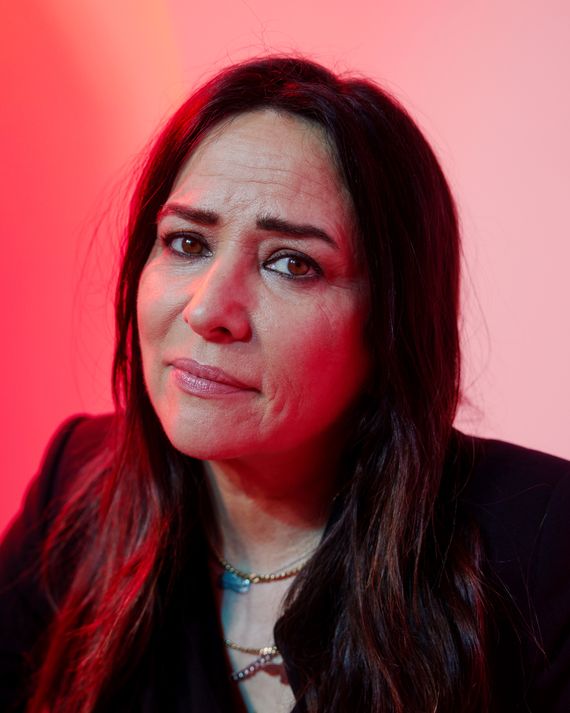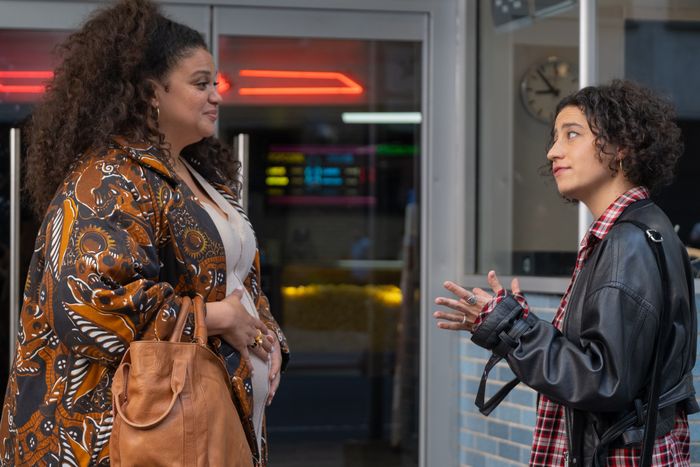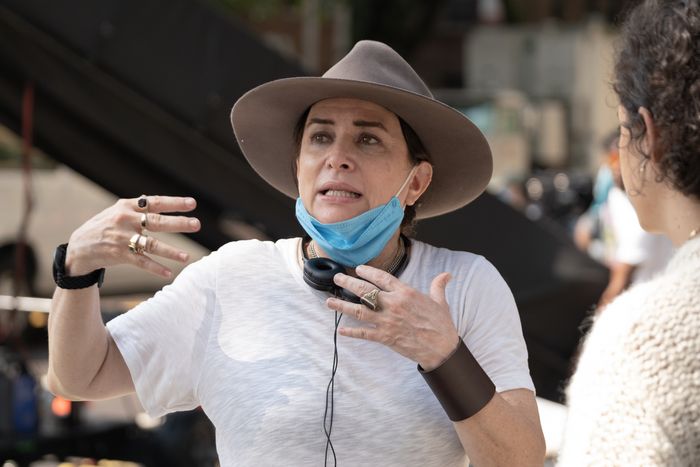
Pamela Adlon’s acclaimed FX comedy-drama Better Things, about an actress and single mother raising three daughters in Los Angeles, finished its five-season run in 2022. Her new film Babes, about two close friends (Ilana Glazer as Eden and Michelle Buteau as Dawn) experiencing pregnancy and motherhood, feels like a continuation in some ways. At the same time, the movie extends the humor of the knockabout Comedy Central series Broad City, in which Glazer and her co-star, Abbi Jacobson, pushed commercial cable’s content restrictions to the breaking point. The result, co-scripted by Glazer and Broad City writer Josh Rabinowitz, is an inventive and often scathingly frank buddy comedy that’s inspired by Glazer’s own experience becoming a mother, but also depicts a strong friendship between women who have each other’s backs even when their bodies are at war with them.
Adlon spoke to Vulture in 2019 about her filmmaking influences as well as her long road to the director’s chair, which began with her applying to NYU film school but not getting in, and continued over two decades as she built up her cinema knowledge through theatrical screenings and home video while making a living as a live-action and voice-over performer (especially in animated series like King of the Hill and Rugrats), finally settling in at Better Things as the primary director as well as a lead actress, writer, and producer. At the time, Adlon talked openly about Better Things’ eagerness to go wherever inspiration took her, even if it resulted in discomfort-inducing plotlines involving periods, colonoscopies, and psychologically disturbing sexual encounters. “An ‘auteur’ is what people call me, but I don’t know how I feel about that,” she said, adding, “FX is paying for my therapy.”
Now that job has passed to coproducers Neon and Hulu. Whether dishing hard truths about dilation, lactation, breast pumps, amniocentesis, the exertions of labor and birth, or the melancholy that takes root even in mothers who adore their kids, Babes finds the sweet spot where slapstick meets body horror. Along the way, it tosses in observations on friendship, marriage, the struggles of being a parent (and a child), and the free-floating ennui that attaches itself to everyone at times. As Adlon tells it, she did it all her way, knowing that her methods are “not everybody’s style.”
Of all the things you could have done after Better Things, what made you choose Babes?
I was in post-production on the final season, and it was just the right time. I read Ilana and Josh’s script, and I thought it had all the elements of the stuff that you know that I like: the rawness, the grossness, the love, the emotion, and the comedy. And I thought I would be able to do my thing — like, put it through my rock tumbler, and take these two acrobats of comedy, Michelle and Ilana, and harness this energy, and guard the characters, the story, the details.
I love that within five minutes of the opening credits, you’ve got a majorly pregnant woman in labor crawling into an elevator on her hands and knees.
Yeah, exactly! I embrace the toilet, and every aspect of that. It was refreshing to not do it for the sake of being gross, but to show that it’s a part of life. You cannot say “pregnancy” without talking about a mucus plug or colostrum or morning sickness. It’s just all part of it.
I’ve been in the room for two births, and wow, did this movie bring me back. The first time, afterward, I was like, “Ah, the miracle of life,” but at the same time, “Nobody told me it would look like a crime scene.”
I say that myself! I remember when I had my first daughter, it was like somebody had attacked me. [Pointing at her crotch] Twelve knives, down here! But if I was attacked, they would have kept me in the hospital for two weeks. When I gave birth, it was 24 hours of stop, drop, and roll right out with the baby. I couldn’t even sit down. When you’re all done, you are presented with a human baby person, and they expect you to put it in a car seat and drive it home and take care of it.
It is surreal.
It’s fucking batshit crazy! What’s also crazy is people who say, “Oh, you know what? I want to have a baby on purpose.” Why do they do that? That’s as baffling to me as people getting married without the biological imperative of a child on the way. I’m like, what, you’re getting married and you don’t even have to?
And what about all of the stuff leading to the birth? Amniocentesis is something movies and TV don’t often show, I guess because it’s considered too scary? You build a scene around it.
I swear to God, people just don’t want to show anything like that. I hate that — I mean, the way everybody needs to take the teeth out of everything is why we are becoming a society of soft shells. What are we protecting people from? Why not just put the needle next to the pregnant lady’s belly, explain what it is, and stick it in?
Then there’s the scene with the breast pump that the saleswoman says is so powerful that — what is the line?
“So powerful, it can pull milk from boy children.” Oh, yeah! I never saw a breast pump or lactation device in my life until I went to a place in Santa Monica called the Lactation Station. It was like the Petersen Automotive Museum of breast pumps. There were so many models. And then I changed my baby’s diaper and then she peed, and it went all down her onesie, and I didn’t have a new onesie for her. Nobody told me to bring an extra set of clothes for the baby. That’s what it’s like. You are so bombarded by new information when you’re a new parent, but not a lot of actual practical stuff, like how to prepare for spending a day away from home with a baby.
You have to pack like you’re climbing Mount Everest.
It’s interesting that you said that, because I remember being so exhausted as a pregnant woman, and somewhere I read — I think maybe it was in What to Expect When You’re Expecting — that a pregnant woman at rest uses more energy than a non-pregnant person climbing a mountain. That made so much sense to me, because even at rest, on the inside, you’re literally building a human body, like in one of the Body Snatchers movies!
Did you know that the “pod sound” that’s been used in every version of the Body Snatchers story since the 1970s is a recording of an ultrasound being done on the sound designer Ben Burtt’s wife, Margaret Darragh?
That’s incredible! I didn’t know that, and yet somehow, I always knew that sound was a recording of an ultrasound. But wait — which version of Body Snatchers was the first one to use that sound?
The 1978 version, with Leonard Nimoy rocking a turtleneck like he’s running Satan’s menswear store.
Oh, god, Nimoy is so hot in that! That performance is erotic art.
There are also moments of character development without dialogue in Babes that reminded me of your directing on Better Things, like the montage about Dawn’s dissatisfaction, where you see her in everyday situations and you can tell by her expression that she’s thinking, like the old Peggy Lee song goes, “Is That All There Is?”
Yeah, that montage is where the penny drops for her. Me and Annie Frank, who edited it with me, called that sequence “Dawn’s Bum-Out.” It’s saying, “There’s no rhyme or reason to how she ended up feeling like this.” She lives what seems like a perfect life in this brownstone with a gorgeous husband that adores her, and he’s in there stepping up as a partner and a dad to her two kids, and they have the perfect nuclear family, and then she turns her head and she’s dark. Yes: darkness. And she’s giving him a birthday cake with their son, and then she goes behind the rails of the stairs and sits and stares at them.
An imprisonment image, but without putting too fine a point on it — always a risk with staging like that.
Exactly. It was really important to me to set up that moment and then just let it be, and not, you know, put a diagnosis on her. And these kinds of feelings, the feelings that we show in this movie, these mixed feelings that are so mysterious — are they so unforgivable? Is it unforgivable to still feel sad and scared when you have healthy children and don’t really lack for anything?
There’s a baseline of empathy in the movie even when the characters are making asses of themselves, which is another point of comparison with Better Things.
I hope so. I also tried to be very protective of the men in this movie, who all showcase vulnerabilities. Like in the case of the John Carroll Lynch character who is the OB/GYN. When you’re a woman and you go to the OB/GYN, you’re in the most vulnerable position you can ever be in, in every sense. But he’s the one who needs validation from the women, which to me is so funny because, you know, he’s a man, and he’s like, “I got plugs because my wife didn’t like bald guys,” and they’re like, “If it’s not too much trouble [points downward], can you please just check my shit?”
There’s an aesthetic continuity here with what you were doing on Better Things, in the sense that even though it’s a short movie, you carve out space to show people just sort of behaving. It’s not always about plot, plot, plot, plot.
Yeah, that’s important to me. I had to fight for those moments. But it was different this time because I was coming to this movie from Better Things where it was like, “The buck stops here” [points at herself], and I didn’t have to prove myself or fight or go through a chain of emails to get an approval or have a decision made.
What is the relationship between the original script for Babes and the final cut? It sounds like the actors were encouraging each other, and you, to go where inspiration took you.
The cut that people will see now is the closest to the original script that I read. After, you know, battling it out in the editing room, it really is at the place where I feel the most comfortable about it.
Aside from not being the person that the buck stops with, what’s the biggest challenge of doing a feature after Better Things?
There is none. I mean, for me, Better Things was like doing ten features in one season. This was one feature.
What skill did you acquire on Better Things that you were able to apply most successfully to Babes?
I learned so much on Better Things. You know that the way I work is not everybody’s style. You know I like to work fluidly and organically, and sometimes make a big moment out of something that’s not even on the page. You also know that I like to compress down a giant moment and not make a big deal out of it. I had to meet all new people on this one, because the movie was shot in New York and [the production] had a New York base, so I couldn’t take any of my own crew over there. But it was a privilege, and it helped all of us that on Better Things I got to learn how to make films using my method while also being economical with time.
Can you tell me about another filmmaker you worked with early in your career who became an example for you after you started making your own stuff?
I had just had my first kid when I did The Tracey Ullman Show. I watched Tracey like, Wow, I am here watching this bitch direct, star, show-run, trouble-shoot, and still try to get home before dark to be with her own kids, and it was amazing! I had an 18-month-old kid at the time. Watching her do all that made a significant impact on me even at that time, when I was not even imagining that I might one day be in her position.
Jamie Lee Curtis told me there was a stretch of her career where she turned down any job that would take her beyond normal driving distance from her husband and kids.
I get it. I remember having my first kid and being in a trailer on a movie — I could not fucking tell you what it’s called. I have no clue! What I remember is sitting there. I’m just sitting there, waiting and waiting. And it’s one hour, two hours, three hours that I’m waiting to shoot something. What am I doing? I’m going through all this fakakta for a thing where I’m in two scenes. And in what movie? I couldn’t even tell you now. I don’t think it ever saw the light of day. And what I took away from it is that I have to be careful with my time. Thank God I had animation. Still, to this day, voice-over work in animation is my bread and butter, man. And my ex-husband’s. [Laughs.]
Speaking of animation: What’s up with the new King of the Hill episodes?
We’re having fun with that. The last table read we had was the day before yesterday, and Toby Huss was there and Dave Herman and Phil LaMarr, and it was so joyful, and it was so funny. It’s really awesome to be back with everybody, though unfortunately we lost Johnny Hardwick, who played Dale. We’d already recorded four episodes of the first season of the reboot and he passed away. We were all stunned. [Looks upward, smiles.] Love you, Johnny. Wes Archer, who’s one of our animators, has been subbing for Johnny at the table reads. Toby Huss subbed for Johnny the other day and it was un-fucking-believable.
The world needs to know how great Toby Huss’s Frank Sinatra impression is.
Somebody should make a film with Toby as Frank. Ring-a-ding-ding, man!
What’s next for you as a director?
Let’s use this megaphone platform to say: [mimes holding a megaphone to her mouth, does a staticky yell] Please don’t keep hiring men! [Normal voice] Also: [Megaphone] I would really love to get my next movie financed! This little lady wants to direct her next feature! [Normal voice] Seriously, I’d like to be on a set again. I need to be working. I have stuff in development with FX. I have some really fun irons in the fire. But I mainly just want to get back on a set.
I like your chances. You sure do seem to attract good actors to your projects.
That might have something to do with the director. But don’t tell anybody.




